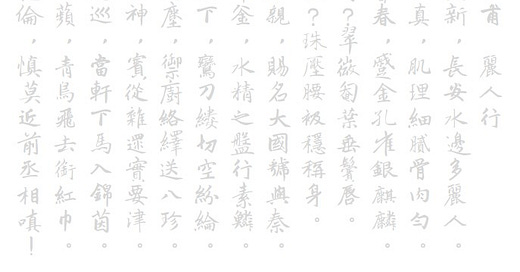Song of the Radiant Women Du Fu The third day of the third month, Was a fine Spring Parade, Beside the river of Chang’an The radiant women played. They breathed glamour and cool poise, With unaffected chic, Their skin shone with a smooth sheen On a shapely-slim physique. And what did they have on their heads? They had fine pendants of green jade To frame each lovely face. And what could be seen behind them? They had fat pearls on their silk belts To weight each swaying waist. There were rare treats from palace cooks: A stream of dishes were bussed By eunuchs flying from Gold Gate On hooves that raised no dust. From jade skillets came sirloin cuts Of purple camel’s hump, While crystal plates served from the sea Herring, white and plump. Those chopsticks carved from rhino horn Had little appetite, The phoenix knives that finely diced Had diced in vain all night. But the drums played, and the pipes keened; The music would move a god! And the crowds followed, tightly packed, Like a busy river ford. In that group were willowy kinsfolk Of she who lives elsewhere: The willowy queen behind cloud drapes, Where spice perfumes the air. Their titles are names of great states: Both Guo and Qin were there. A willowy horseman rode by, How proud and slow his pace! Dismounted on the ornate rug, Entered their private space, As willow flowers like snowflakes Fall on the water’s face To lie where willowy duckweed Receives their pale embrace, While the blue birds of romance brought Red tokens to that place. But fear his fire that burns hands! His power exceeds our gauge. Take care! Stay clear! Do not excite The chancellor’s great rage.
The third day of the third month was a traditional day for visiting the river park and enjoying the spring weather.
Willowy kinsfolk of the willowy queen: Yang Yuhuan was Emperor Xuanzong’s favourite partner; her sisters were present at this picnic. Their surname, Yang, means “willow.”
Several of Yang Yuhuan’s sisters had recently been married to lords of major pieces of territory within the Tang Empire. Two are mentioned here: one who was now the lady of Guo (eastern heartland, modern Shanxi and Henan), and one who was now the lady of Qin (western heartland around the capital, Chang’an.
Willowy horseman: Yang Guozhong, a distant cousin of Yang Yuhuan, now the chancellor of the empire.
Willow flowers...duckweed...blue birds: These symbols imply an affair between Yang Guozhong and one of his cousins, Yang Yuhuan’s third sister, now married to the Pei family and lady of Guo.
Great rage: Yang Guozhong was known to have a fierce temper.
This poem presents two distinct problems.
The first problem is that I simply don’t believe the reading given by historical critics. That reading claims that in 753, when Yang Guozhong was at the height of his power, having recently been appointed chancellor (the highest political office in the empire), Du Fu, who was living in Chang’an and actively seeking work in the imperial bureaucracy, wrote a poem attacking Yang. On this reading, Song of the Radiant Women is a satire of the extravagance of the Yang family; mentions the fact that Chancellor Yang was having an affair with one of his cousins; and notes Yang’s famously fiery temper.
This reading appears to match the text very well, and yet it is hard to credit. The imperial workplace was notoriously factional and dependent on personal relationships. A nobody like Du Fu would have to be spectacularly obtuse to write a poem criticising the current chancellor. And this assumes that Du was sufficiently in-the-loop to know the latest gossip about the chancellor’s personality and his private affairs. It all seems very unlikely to me.
And yet... I have no better reading. And the satire reading is supported by the critic I find the most insightful, Jin Xingyao. So I am accepting it for this translation.
The second problem with this poem is that it demands some quite detailed knowledge of the specifics of the politics of the day.
This is different to the standard culture-gap problem presented by classical Chinese poetry. Tang poetry often assumes that the readers will be familiar with certain cultural objects, ideas, and events that modern readers do not know about. When I encounter this kind of cultural commonplace, I generally aim to insert sufficient information into the translation so that modern readers can experience the poem in the same way as the original audience did. Readers should not need to break their reading to seek out references that the original audience were already intimately familiar with.
But this poem requires specific knowledge that goes beyond the shared cultural stock. You need to know about specific titles, and about the accusations of incest around Yang Guozhong, before you can even understand what is happening. And there is no reason to think that the “average reader” would know these things, even among Du Fu’s contemporaries.
So the question for the translator is how to deal with these knowledge gaps? Footnotes are one obvious solution, but they can be tedious and unpoetic. I have tried to insert enough information into the poem that it can be read, and some vague outline of the implicit message perceived. I hope this form is effective.
杜甫 丽人行
三月三日天气新,长安水边多丽人。
态浓意远淑且真,肌理细腻骨肉匀。
绣罗衣裳照暮春,蹙金孔雀银麒麟。
头上何所有?翠微匎叶垂鬓唇。
背后何所见?珠压腰衱稳称身。
就中云幕椒房亲,赐名大国虢与秦。
紫驼之峰出翠釜,水精之盘行素鳞。
犀筯厌饫久未下,鸾刀缕切空纷纶。
黄门飞鞚不动尘,御厨络绎送八珍。
箫鼓哀吟感鬼神,宾从杂遝实要津。
后来鞍马何逡巡,当轩下马入锦茵。
杨花雪落覆白蘋,青鸟飞去衔红巾。
炙手可热势绝伦,慎莫近前丞相嗔!



